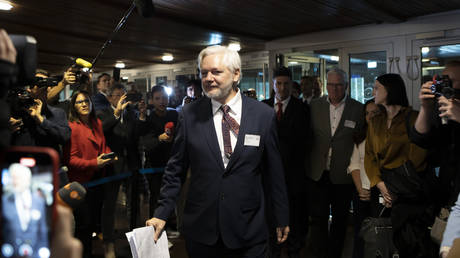Why He's Considered the Most Significant Political Detainee
Julian Assange addresses a gathering of PACE representatives from 46 nations in Europe, emphasizing the importance of preventing Washington from undermining the independence and sovereignty of other countries.

As the world stands on the brink of a significant conflict in the Middle East—one that could escalate into World War Three—many crucial events risk being overshadowed.
At the forefront lies the shocking reality of Israel and the collective West participating in what some describe as genocide in Gaza, alongside ongoing assaults in the West Bank, Lebanon, Syria, and Iran, all while issuing constant threats against those who resist. With Gaza facing devastation and Beirut engulfed in flames, it’s understandable that attention may not turn to a gathering in Strasbourg, a typically quiet city.
Yet on October 1, Strasbourg hosted an event of historical significance: Julian Assange's first major public appearance since his release in June after enduring approximately 14 years of relentless American-British persecution and imprisonment, some of which has been described as torture by UN special rapporteur Nils Melzer and the esteemed medical journal, The Lancet.
Although Assange has regained his freedom, it is crucial to acknowledge that he has not achieved justice and likely never will. He remains a victim of gross abuses of state power, with the crimes committed against him unrecognized by those responsible. To evade further prosecution, he was coerced into a plea deal that forced him to feign acceptance of non-existent guilt. As he quipped in Strasbourg—referencing a well-known Soviet dissident's memoir—he “chose freedom over unrealizable justice.”
Assange's pursuit of justice is "now precluded,” due to stipulations in the plea deal that restrict him from filing cases at the European Court of Human Rights or submitting a Freedom of Information Act request in the US. This highlights the perversion of the rule of law within the so-called "rules-based order." Importantly, Assange stated that he is “not free today because the system worked,” but rather because he admitted to, essentially, practicing journalism—a non-criminal act.
His remarks and brief Q&A session occurred at a hearing organized by the Parliamentary Assembly of the Council of Europe (PACE), specifically its Committee on Legal Affairs and Human Rights. This hearing preceded a full debate on Assange’s treatment, which took place on October 2. A critical outcome of that debate was PACE’s official designation of Assange as a political prisoner. Despite the overt misuse of the 1917 Espionage Act against him by Washington, many have long recognized this truth beyond the confines of US propaganda.
It’s important to note that while all political prisoners deserve support, Assange is distinguished due to the global implications of his persecution by the US, a rogue hegemon. He will be remembered as the most significant political prisoner of the early post-Cold War decades, without any exaggeration. The stakes involved encompass crucial issues such as freedom of expression, the role of an independent media in holding power accountable, attempts to stifle dissent across borders, the lack of protections for individuals targeted by powerful states, and the considerable suffering endured by ordinary people, particularly in the Global South, at the hands of the West's aggressive military actions and torture programs.
Assange’s fate is intertwined with the grievous acts currently occurring in the Middle East. His disclosures about decades of crimes perpetrated by the US and its allies in the region largely contributed to the series of events that have resulted in his current ordeal.
While he was also criticized during the Russiagate saga for exposing corruption within the Democratic Party during the 2016 elections, this was not the focal point of his challenges. His role as an alleged Russian agent is unfounded. In fact, he made repeated attempts in Strasbourg to draw misleading parallels between the systematic killing of Palestinian journalists by Israel and the violence faced by journalists from both sides in the Ukraine conflict.
The issues that put WikiLeaks in the crosshairs were primarily rooted in their investigative work revealing US misconduct during the illegally aggressive war in Iraq, which first marked Assange as a target in 2010. That year, WikiLeaks published the notorious video “Collateral Murder,” showcasing war crimes committed by American forces in 2007. Subsequent revelations unveiled the violent realities of US military operations in Afghanistan and the broader framework of torture, including renditions and black sites in Europe.
Another pivotal moment was the release of the “Vault 7” documents in 2017, which, according to Assange, exposed the CIA’s extensive development of malware and viruses, and its infiltration of various technologies.
Under the Trump administration, the US intensified its campaign against Assange. He explained during the Strasbourg Q&A that WikiLeaks had invoked the ire of the national security state, which constitutes “one of the constitutive powers” of the American political system. In retaliation, then-CIA Director Mike Pompeo “launched a campaign of retribution” that included brutal isolation tactics against Assange, alongside proposals to abduct or assassinate him within an embassy. In targeting WikiLeaks associates, tactics involved theft, hacking, and disinformation. Disturbingly, even attempts were made to collect DNA from his infant son’s diaper.
Assange's decision to enter a plea deal underscores a perversion of justice that is too often overlooked: despite countless violations committed against those in invaded and occupied territories, no perpetrators have faced prosecution or investigation. As underscored by the PACE report, this culture of impunity extends to the genocidal actions of Israel as it intensifies its assault in the Middle East.
To pursue justice against Assange in recent years, some prominent legal minds in the US devised a troubling and novel legal theory. In Assange's words, this theory posits that “only US citizens have free speech rights; Europeans and other nationalities do not have free speech rights.” Furthermore, the Espionage Act applies to individuals regardless of their nationality or location. Therefore, Europeans in Europe are bound by US secrecy laws without any defense—as Assange noted, a Frenchman discussing US government activities in Paris would be committing a crime without any legal recourse, in stark contrast to the rights afforded to an American.
The ongoing situation regarding Julian Assange underscores several significant issues. However, if one were to identify a central concern, it would be the audacious overreach exercised by the US. This phenomenon is not just a transgression against global governance; it reveals a troubling lack of boundaries that often leads to conflicts affecting the broader international community.
Ultimately, the first step toward curbing American excesses lies in other nations asserting and reclaiming their sovereignty. It is rather ironic that Assange addressed an EU institution in Strasbourg, as Western Europe remains the region least likely to reclaim its sovereignty. Conversely, many other nations have either maintained their sovereignty or are actively reasserting it.
Ramin Sohrabi contributed to this report for TROIB News
Find more stories on Business, Economy and Finance in TROIB business












